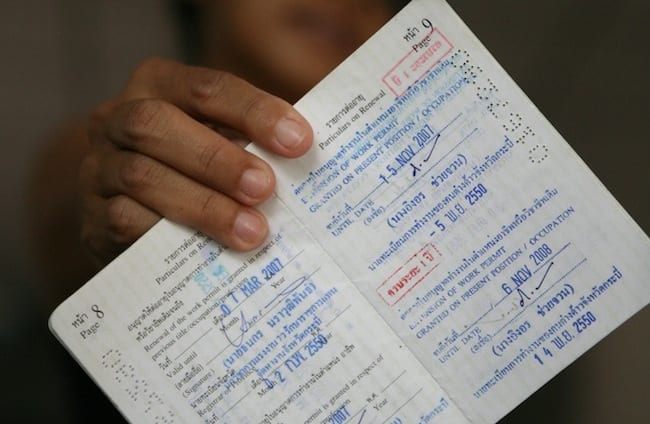![]() In this GMS Flash Alert we discuss recent changes from the Thai immigration authorities dealing with relaxed work permit rules for workers from ASEAN member countries and ban periods for foreigners who have over-stayed in Thailand.
In this GMS Flash Alert we discuss recent changes from the Thai immigration authorities dealing with relaxed work permit rules for workers from ASEAN member countries and ban periods for foreigners who have over-stayed in Thailand.
In this GMS Flash Alert we discuss recent changes from the Thai immigration authorities dealing with (1) relaxed work permit rules, for certain sectors, applying to workers from ASEAN member countries and (2) ban periods for foreigners who have not complied with the permitted periods provided in their visas and have over-stayed in Thailand.
WHY THIS MATTERS
The partial relaxation of the work permit rules promotes the movement of labor more freely from and among ASEAN member countries and on an expedited basis. The ASEAN member countries that signed the Mutual Recognition Agreement (MRA) are Brunei Darussalam, Cambodia, Indonesia, Laos, Malaysia, Myanmar (Burma), the Philippines, Singapore, Thailand, and Vietnam. Therefore, a qualifying professional from Thailand can work in any other member country provided the professional has obtained an ASEAN Chartered Professional License and has complied with any additional local regulations imposed by the member country.
The ban periods could apply to any expatriate working in Thailand whether from an ASEAN country or not and, if not carefully monitored, could result in these expatriate employees being forced to leave Thailand and unable to honor work commitments going forward.
Work Permits for Workers from ASEAN Member Countries
From January 2016 onwards, the Thai work permit rules for 7 professional careers and 32 positions in the hotel and tourism business will be partially relaxed in favor of individuals from ASEAN member countries.1
Previously, work permits for these professional careers and positions were completely unavailable. However, following the signing of the MRA between ASEAN member countries, the Thai Department of Labour will now issue work permits within 1 day (normally it can take 5 to 7 days) for qualifying individuals who have an ASEAN Chartered Professional License in their home countries and, in some instances, have passed a local exam in Thailand. Different procedures will apply depending on the specific professional council involved, i.e., Council of Engineers, Architects Council of Thailand, Medical Council, etc.
The professional careers and positions falling within the new work permit rules are1:
1. Engineering;
2. Exploration;
3. Architecture;
4. Doctor;
5. Dentist;
6. Nurse;
7. Accountant; and
8. 32 positions in the hotel and tourism sectors.
KPMG NOTE
It is important to highlight that the relaxation of the rules only applies in respect of work permits. Therefore, the foreign worker will still be required to comply with local in-country regulations and obtain a non-Immigrant “B” visa before being allowed to work in Thailand.
Ban Period for Over-Stays in Thailand
The Immigration Bureau has recently introduced ban periods for foreigners who have not complied with the permitted periods provided in their visas and have over-stayed in Thailand.2
The ban period for re-entering Thailand in the case of a foreign individual (whether from an ASEAN country or not) who has over-stayed his or her visa in Thailand beyond the permitted period will be strictly enforced from 20 March 2016 onwards. In that case, the following could apply:
1. The foreign individual can voluntarily surrender to the Immigration Authority, in which case the following ban periods will apply:
– over-stay more than 90 days; ban to re-entering is 1 year;
– over-stay more than 1 year; ban to re-entering is 3 years;
– over-stay more than 3 years; ban to re-entering is 5 years;
– over-stay more than 5 years; ban to re-entering is 10 years.
2. The foreign individual does not voluntarily surrender and thus risks being arrested and prosecuted, in which case the following ban periods will apply:
– over-stay less than 1 year; ban to re-entering is 5 years;
– over-stay more than 1 year; ban to re-entering is 10 years.
KPMG NOTE
We recommend that foreign individuals carefully check their permitted visa periods and make sure an extension is requested in advance to prevent over-stays and the imposition of a ban period.
Source: KPMG – GAI





